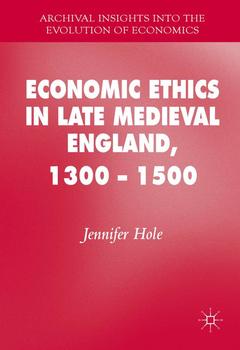Description
Economic Ethics in Late Medieval England, 1300-1500, Softcover reprint of the original 1st ed. 2016
Archival Insights into the Evolution of Economics Series
Author: Hole Jennifer
Language: English
Subjects for Economic Ethics in Late Medieval England, 1300-1500:
Approximative price 126.59 €
In Print (Delivery period: 15 days).
Add to cartPublication date: 10-2016
Support: Print on demand
Approximative price 126.59 €
In Print (Delivery period: 15 days).
Add to cartPublication date: 06-2018
Support: Print on demand
Description
/li>Contents
/li>Biography
/li>Comment
/li>
Drawing on an array of archival evidence from court records to the poems of Chaucer, this work explores how medieval thinkers understood economic activity, how their ideas were transmitted and the extent to which they were accepted. Moving beyond the impersonal operations of an economy to its ethical dimension, Hole?s socio-cultural study considers not only the ideas and beliefs of theologians and philosophers, but how these influenced assumptions and preoccupations about material concerns in late medieval English society. Beginning with late medieval English writings on economic ethics and its origins, the author illuminates a society which, although strictly hierarchical and unequal, nevertheless fostered expectations that all its members should avoid greed and excess consumption. Throughout, Hole aims to show that economic ethics had a broader application than trade and usury in late medieval England.
Jennifer Hole is currently Honorary Research Fellow in the Department of History at the University of Western Australia. Her previous background was in commerce, specialising in industry analysis.
Through archival records in the form of letters, statutes, petitions and manorial court records the author examines economic ethics and practices in late medieval England
Offers a new perspective on business-ethics and how individuals responded to moral issues arising from economic activity
Traces where economics became separated from ethics




